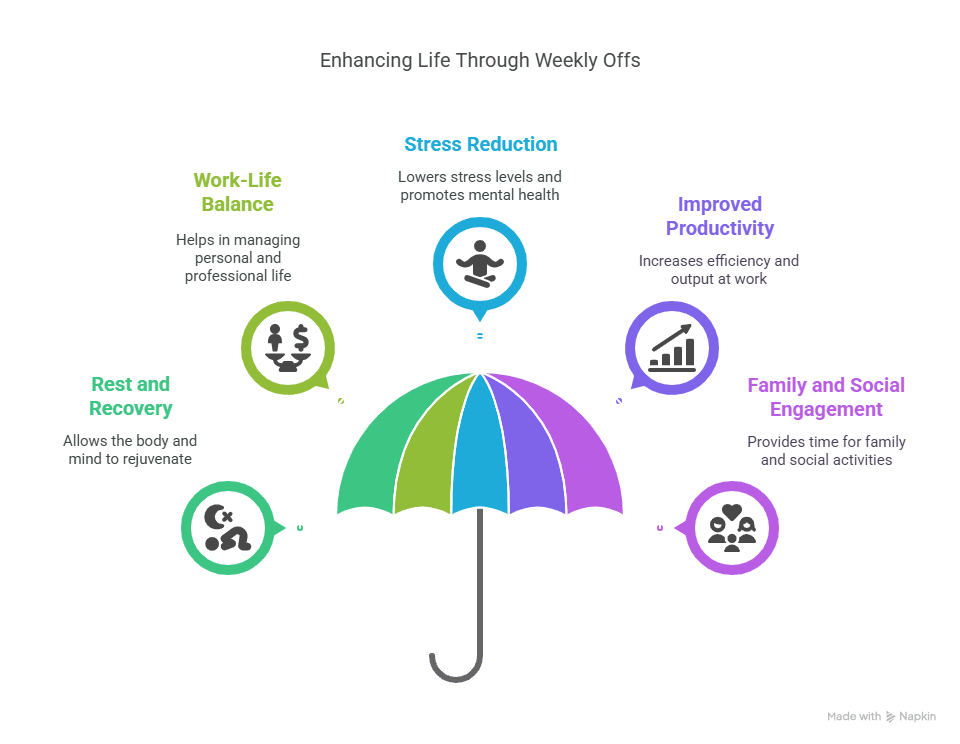What is Week Off? | Week Off Meaning
Week Off typically refers to a designated period of time, usually a full week, during which an individual is granted time away from work or other regular responsibilities. This could be due to various reasons, such as vacation, personal time, or a break between employment contracts. The purpose of a week off is to allow individuals to rest, relax, recharge, and attend to personal matters without the obligations of their usual work routine.
Benefits of a Week Off
- Rest and rejuvenation
- Improved productivity
- Enhanced mental well-being
- Opportunity for personal pursuits
A week off is a designated period of time, typically lasting a full week, during which individuals take a break from their regular work responsibilities. It serves the purpose of providing rest, relaxation, and an opportunity to address personal matters, distinguishing itself from the shorter regular weekends that are part of the weekly work schedule.
What is Weekly Off?
Weekly off refers to a designated day of the week on which an individual is not required to work. In many employment settings, especially those with a standard Monday-to-Friday workweek, the weekly off day is commonly referred to as the “weekend.” The specific day designated as the weekly off can vary depending on regional practices, cultural norms, and individual employment contracts.
Benefits of a Weekly Off

a weekly off is a scheduled day during the week when an individual is not expected to work, providing an opportunity for rest, leisure, and personal activities. While the traditional weekly off for many industries is Saturday and Sunday, variations exist based on regional practices, cultural norms, and the nature of the job.
- Rest and Recovery
- Work-Life Balance
- Stress Reduction
- Improved Productivity
- Family and Social Engagement

What is a Rotational Week Off?
Rotational Week Off” refers to a system where employees have their days off on different days of the week, and this schedule rotates over a specified period. In this arrangement, rather than having a fixed or consistent day off each week, employees follow a rotating schedule, allowing them to have days off on different weekdays over a set period.
Advantages of Rotational Week Off
- Equitable distribution of workloads
- Flexibility for employees
- Increased job satisfaction
- Enhanced teamwork
Overall, the use of rotational week offs is a strategy employed by some organizations to manage staffing needs efficiently and provide employees with a balanced distribution of days off. The specific rotation pattern may vary based on the organization’s needs and the nature of the industry.
Taking a off is important. You can work on many pending tasks on these offs.
Week Off | Weekly Off | Rotational Off
Here’s a clear comparison table showcasing the differences between Week Off, Weekly Off, and Rotational Week Off:
| Feature | Week Off | Weekly Off | Rotational Week Off |
|---|---|---|---|
| Definition | A general term for a day off from work. | A fixed weekly holiday (e.g., Sunday). | A scheduled off day that changes every week. |
| Meaning | A day of rest where employees are not required to work. | A specific day off given every week as per company policy. | Employees get a different day off each week, depending on shift schedules. |
| Who Follows It? | Applies to all employees but depends on company policy. | Common in traditional businesses, offices, and government jobs. | Mostly seen in industries with shift-based work like retail, healthcare, and customer service. |
| Fixed or Changing? | Can be fixed or flexible depending on the organization. | Always fixed (e.g., Sunday for most businesses). | Changes based on a rotational schedule. |
| Example | An employee working Monday to Friday gets Saturday & Sunday off. | A retail store gives employees every Monday off. | A call center assigns an off day that rotates each week (e.g., Monday this week, Tuesday next week). |
| Industries Using It | Offices, corporate jobs, and businesses with flexible policies. | Government jobs, educational institutions, offices. | BPOs, healthcare, hospitality, media, and retail industries. |
Week Off or Weekly Off; Which is Correct?
Both “week off” and “weekly off” are correct and commonly used, but their usage can depend on the context.
“Weekly off” is a term commonly used in business and employment contexts to refer to a scheduled day off from work that occurs once every week. For example, if an employee has Saturdays and Sundays off regularly, you could say they have a “weekly off” on those days.
“Week off” is more casual and is often used in everyday conversation to express taking a break or having a day off during the week. For instance, someone might say, “I am planning to take a week off in June.”
So, in a work-related or formal setting, “weekly off” is generally more appropriate, while “week off” might be used in informal or conversational contexts.

Tips for Maximizing the Productivity of Your Week Off
- Plan Ahead:
- Outline your goals and priorities for the week off in advance. Whether it’s relaxation, personal projects, or travel, having a plan can help you make the most of your time.
Disconnect from Work:
- Use this time to truly detach from work-related emails, calls, and tasks. Create clear boundaries to ensure you’re fully present during your week off.
Engage in Activities You Enjoy:
- Allocate time for activities that bring you joy and relaxation. Whether it’s reading, hiking, or spending time with loved ones, engage in activities that recharge you.
Explore New Hobbies:
- Consider trying out new hobbies or activities that you’ve been curious about. Your week off is an opportunity to explore and discover new interests.
Digital Detox:
- Consider a temporary break from excessive screen time and social media. This can contribute to a more mindful and rejuvenating experience during your week off.
Recharge Physically:
- Pay attention to your physical well-being. Get enough sleep, maintain a healthy diet, and consider activities like exercise or yoga to promote overall wellness.
Reflect and Set Goals:
- Use this time for self-reflection. Assess your personal and professional goals, and set intentions for the upcoming weeks or months.
Connect with Loved Ones:
- Spend quality time with family and friends. Strengthening social connections can contribute significantly to your overall well-being.
Tackle Personal Projects:
- If you have personal projects or tasks that you’ve been putting off, your week off can be a great opportunity to tackle them and make progress.
Travel or Explore Locally:
- If feasible, consider traveling to a new destination or exploring local attractions. Experiencing new environments can be refreshing and inspiring.
Cultivate Mindfulness:
- Practice mindfulness and be present in the moment. This can enhance your overall experience and contribute to a sense of peace and tranquility.
Delegate Responsibilities:
- If applicable, delegate responsibilities or tasks to others before your week off to ensure a smooth transition and minimize stress.
Limit Work-Related Communications:
- If you must address work-related matters, set specific times for checking emails or messages. Avoid letting work dominate your entire week off.
Capture Memories:
- Take photos, journal, or capture memories in a way that allows you to reminisce about the positive experiences during your week off.
Ease Back into Routine:
- As your week off comes to an end, plan a gradual return to your regular routine. This can help ease the transition and maintain the benefits of your time off.
“Week off” is more casual and is often used in everyday conversation to express taking a break or having a day off during the week. For instance, someone might say, “I am planning to take a week off in June.”
So, in a work-related or formal setting, “weekly off” is generally more appropriate, while “week off” might be used in informal or conversational contexts.
Remember, the key is to balance productivity with relaxation and enjoyment during your week off. Tailor these tips to align with your personal preferences and goals for the time away.
Real-World Examples of Rotational Week Offs(USA, Brazil, Canada)
Example 1: USA – Amazon Warehouse Shift Workers
Industry: Logistics/E-commerce
Schedule: Employees work 4 days on (10-hour shifts), followed by 3 days off. The rotational week off shifts every month to ensure weekend coverage.
Compliance: Follows FLSA guidelines (no federal weekly off mandate), but Amazon voluntarily provides overtime pay (1.5x) for shifts exceeding 40 hours/week.
Outcome: Reduced burnout and 15% higher retention in Nevada fulfillment centers.
Example 2: Brazil – Retail Workers at Lojas Renner
Industry: Retail
Schedule: Employees work 6 days on, 1 day off under CLT Article 67. The weekly off rotates (e.g., Monday one week, Thursday the next) to keep stores open daily.
Compliance: Workers receive double pay if required to work on their weekly rest day. Penalties include fines up to 5x the employee’s daily wage for violations.
Example 3: Canada – Oil Sands Workers in Alberta
Industry: Energy
Schedule: 14 days on, 7 days off (fly-in/fly-out rotational model). Weekly offs are staggered to maintain 24/7 operations.
Compliance: Aligns with Alberta’s Employment Standards Code: 1 day off/week averaged over 2 weeks. Overtime paid after 8 hours/day.
Rotational Week Off in Healthcare (USA Example)
Nurses at Johns Hopkins Hospital follow a 3-week rotation: 6 days on, 2 days off. This complies with Maryland’s labor laws…
Weekly Off Laws in the United States(FLSA Guidelines)
The Fair Labor Standards Act (FLSA) does not federally mandate weekly offs. However:
State Laws:
California: 1 day off in 7 for non-exempt workers (Labor Code §551).
New York: 24 consecutive hours off/week for retail workers.
Overtime Pay: Employees working 7 consecutive days must receive 1.5x pay for hours over 40 (FLSA §207).
Exemptions: Healthcare, transportation, and hospitality industries may use rotational schedules without penalties.
Penalty for Violation: Fines up to $1,000 per employee (varies by state).
How to Implement Rotational Week Offs in Healthcare(2025 Examples)
Johns Hopkins Hospital (Baltimore, USA) – 2025 Model
Schedule: 3-week rotation:
Week 1: Mon-Wed (7 AM–7 PM), Thu-Sun off.
Week 2: Thu-Sun (7 PM–7 AM), Mon-Wed off.
Week 3: Training/on-call days.
Compliance: Follows Maryland’s 1 day off in 7 rule. Overtime paid after 12 hours/day.
Tech Integration: Uses AI-driven apps like QwickShift to automate rotations and avoid burnout.
Benefits:
30% fewer shift-swap requests.
Complies with OSHA’s 2024 nurse fatigue guidelines.
Brazil's CLT Weekly Rest Rules: What Employers Must Know
Under CLT (Consolidação das Leis do Trabalho) Article 67:
Weekly Rest: 24 consecutive hours off, preferably on Sundays.
Compensation: Double pay + compensatory leave if worked.
Rotation: Permitted in sectors like retail/hospitals, but employees must get 1 Sunday off/month.
Example:
Retail Chain (Magazine Luiza): Staff rotate Sundays off (e.g., Employee A: 1st Sunday, Employee B: 2nd Sunday).
Penalties: Fines up to R$5,000 per employee for denying weekly rest (Ministério do Trabalho).
Rotational Week Off Compliance Checklist for Employers
Use this checklist to avoid legal risks:
✅ For USA:
Check state laws (e.g., CA, NY mandate weekly offs).
Document rotational schedules in employment contracts.
Pay 1.5x overtime for >40 hours/week.
✅ For Brazil:
Guarantee 1 Sunday off/month (CLT Art. 67).
Provide double pay + compensatory leave for worked rest days.
✅ For All Countries:
Use shift-planning software (e.g., Deputy or Tanda).
Review schedules quarterly for fairness.
Train managers on local labor laws.
FAQs on Week Off and Weekly Off
What is the difference between a week off and a weekly off?
A week off usually refers to taking an entire week off from work, while a weekly off is a scheduled day off that occurs every week, such as Sunday or Saturday.
Are weekly offs mandatory for all employees?
In most countries, labor laws mandate at least one weekly off for employees, but the specific rules vary by industry and region.
Can an employer change my weekly off day?
Yes, employers can change weekly offs based on company policies, workload, or shift rotations, but they must comply with labor laws and employment contracts.
Is a week off considered paid leave?
A week off can be paid or unpaid, depending on the reason (vacation, sick leave, company policy) and the employee’s leave balance.
Can I request a different weekly off than my company’s standard off day?
Some companies allow employees to choose their weekly off based on personal needs, while others have fixed schedules depending on business requirements.
Do part-time employees get a weekly off?
It depends on company policies. Some part-time employees may get a prorated weekly off, while others may not, based on their working hours.
Can I work on my weekly off and take another day off instead?
In many cases, employees can swap their weekly off if agreed upon with their employer, but this depends on company policies and labor regulations.
Is a weekly off the same as a public holiday?
No, a weekly off is a regular rest day, whereas public holidays are designated national or religious holidays that may be paid or unpaid.
What happens if I work on my weekly off?
Employees who work on their weekly off may receive compensatory leave, overtime pay, or additional benefits, depending on company policy and labor laws.
Are weekly offs different in shift-based jobs?
Yes, in shift-based jobs like retail, healthcare, or IT, weekly offs may not fall on weekends and can vary depending on the work schedule.
Is rotational week off mandatory in Australia?
In Australia, labor laws mandate a maximum of 38 working hours per week, typically spread over five days, with at least one rest day per week. While a standard workweek is common, rotational week offs are not specifically mandated by law. Employers may implement rotational shifts based on operational requirements, but they must ensure compliance with the maximum working hours and provide appropriate rest periods. – 4dayweek.io
Can my employer deny a weekly off in Canada?
Under the Canada Labour Code, employees are entitled to at least one full day of rest per week, typically on a Sunday. Employers are generally required to provide this rest period and cannot deny a weekly day off. However, certain industries or emergency situations may have exceptions, but these are regulated and often require compensatory rest periods. – omnipresent.com
How many weekly offs are required in Brazil?
Brazilian labor laws stipulate that employees are entitled to a remunerated weekly rest period of 24 consecutive hours, preferably on Sundays. This means employees should receive at least one full day off each week. Employers must adhere to this requirement to ensure compliance with national labor standards.- biposervice.com
What are the penalties for not giving a weekly off in the UK?
In the United Kingdom, workers are entitled to a minimum weekly rest period of 24 uninterrupted hours or a daily rest period of 11 consecutive hours within each 24-hour period. Failure to provide these rest periods can lead to legal consequences for employers, including fines and enforcement actions by regulatory bodies. Employees may also have grounds to file complaints or seek compensation for breaches of their rest entitlements.- ilo.org
Please note that labor laws can vary based on specific circumstances, industries, and updates to legislation. It’s advisable to consult the relevant labor authorities or legal experts in your jurisdiction for personalized advice.






